Wisia Sobierajska Watkins
This is the third in our series of stories about Pani Wisia and her journey from eastern Poland to Siberia, Persia, Kenya, England, Kenya again, South Africa—and finally—to New Zealand.
FROM FORCED EXILE TO BRUSHING WITH GREATNESS
by Barbara Scrivens
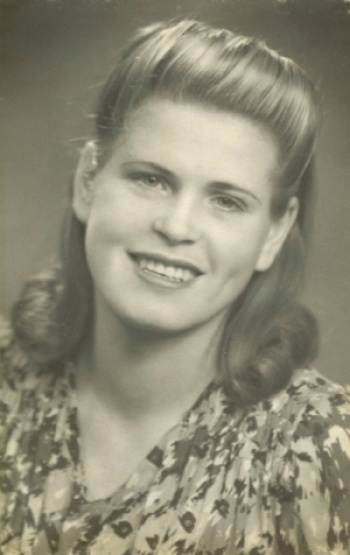
When teenaged Wisia Sobierajska struggled for survival in the Soviet Union, after being ripped from her home in Poland, little did she imagine that she would migrate halfway around the world, or shake hands with a Pope—and a Polish Pope at that.
In late November 1986 Pope John Paul II became the first pontiff to visit New Zealand. His 48-hour sojourn included celebrating open-air Masses at the Domain in Auckland, Athletic Park in Wellington, and Lancaster Park in Christchurch.
Before the Mass in Wellington the Pope had a meeting with the Governor General, Sir Paul Reeves. Wisia’s husband, Bill, seen in the photograph below behind Wisia, had by then been on the staff at Government House for several years.
“I was presented to the Pope with the other staff members and I spoke to him in Polish.” Hearing a familiar language within the residence of a Governor General in New Zealand made the Holy Father pause.
“He said to me, ‘And what are you doing here?’ And so I said, ‘At the moment I’m greeting your Holiness,’ and then I explained quickly how I got here and our situation—that my husband was working here and that we’ve got accommodation here.
“We spoke in Polish. He nodded and smiled and shook my hand so nicely, rubbing it gently. He was so pleasant, I felt so warm. Afterwards all I could think was, ‘Ah, that was lovely.’
“It was wonderful to see a Pole at the very top of the most religious Catholic organisation and I knew that I belonged—I was one of his sheep.”
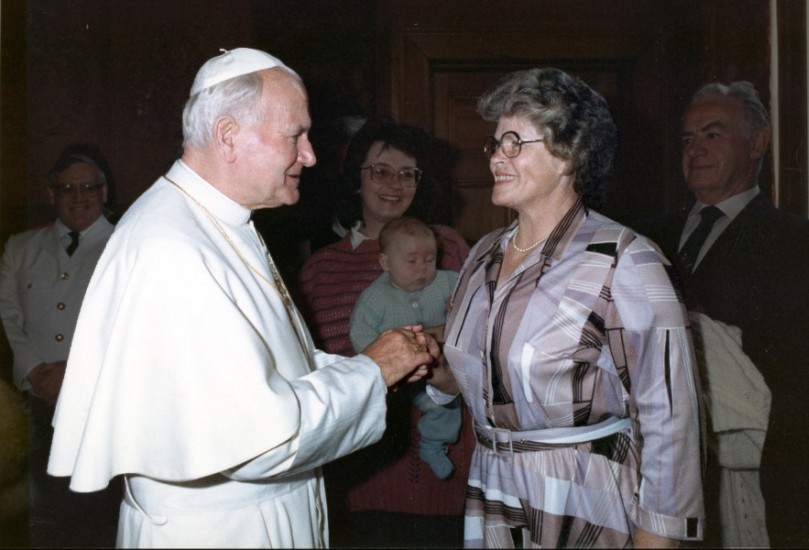
One of two photographic reminders of her meeting with John Paul II that hung in Wisia’s lounge.
Her only regret and embarrassment about the occasion is that the meeting so overwhelmed her that she forgot to kiss the pontiff’s ring.
Wisia found it far easier to explain “quickly how I got here” to this kindly Pole, who knew the history of their fellow countrymen in World War 2, than to the New Zealanders she met daily. Pope John Paul II would have instantly placed Wisia in the group of nearly 1.7 million Poles that included those abducted from their homes by Soviet soldiers and incarcerated in Siberian prisons, gulags and other types of forced-labour facilities throughout the USSR. He knew that she deserved those few extra minutes of his time.
_______________
Whereas in New Zealand the Pope’s visit attracted crowds of thousands, when Princess Margaret visited Kenya, Wisia’s was one of far fewer European faces. Wisia and Bill had lived in southern England for 10 years and Wisia, tired of the cold and wet winters, supported her husband when he took a Crown position with the East African government’s police force. They arrived in Mombasa in 1956.
Kenyans decorated their streets for the occasion. Princess Margaret, standing in for a pregnant Queen Elizabeth, looked on Wisia suspiciously during a walkabout:
“Haven’t I met you before?” asked the Princess when Wisia proffered her hand for shaking at the third venue.
“She was quite right.” Wisia laughed. “There were four of us police wives, and because we knew the route, and there were so few Europeans, we went from one place where we knew she was going to be, to the other. We had a car so we could keep in front of her.”
They did not have the same success with Prince Phillip, who accompanied Princess Margaret but had a different schedule. The police wives waited several hours for him to arrive at a destination but was late and gave them only a general wave from the old-fashioned Rolls Royce.
“It was still nice to see him.”
Princess Margaret, just a few years younger than Wisia, may have noticed their elegant outfits, as the police wives did not have the time to change their dresses between handshakes.
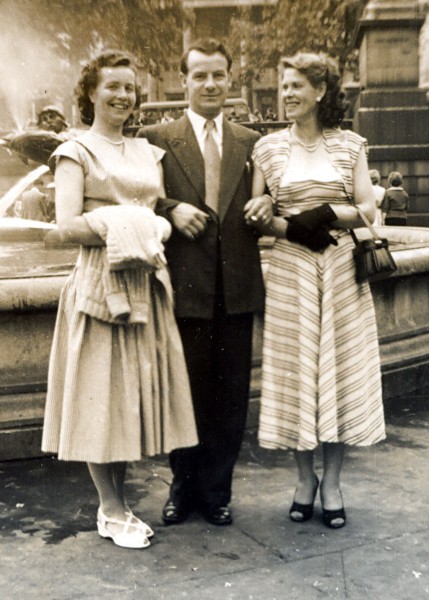
In London with Bill and a friend (left) in 1953, illustrates what Wisia described as the “everything matching” fashion.
The Watkins enjoyed life in Mombasa but increasing problems with the Mau Mau, the expense of schooling, and overall cost of living influenced their decision after three years to move back to England. That decision changed when they broke their journey for a holiday in South Africa and stayed until 1968.
_______________
Bill found getting a job in South Africa more difficult than he expected. His short stint as a bus conductor—chaotic because of his lack of knowledge of the hilly Durban streets—preceded an equally brief spell in Durban racecourse’s betting office.
“He was so disgusted at what some of the men would pawn to place a ‘sure’ bet. Some men gave away their jackets for a few shillings, or their wedding rings, and one man lost his shoes.”
Bill settled into a foreman’s position at the Dunlop tyre factory but the reality of South African conscription began to unsettle Wisia. Her oldest son, Roger, then 20 and born in England, was not automatically eligible but she feared for her two other sons, David, born in Mombasa and Billy in Durban.
“I said to Bill, ‘I’m not letting my boys go to the army. I’m fed up with wars.’”
Wisia not only worried about a similar conflict occurring in South Africa as that with the Mau Mau in Kenya. She well-remembered the increasing tensions in her home town of Tajkury in eastern Poland in the months immediately after the Russians invaded on 17 September 1939.
The Ukrainians living in eastern Poland became more militant and belligerent as they embraced the Russian invaders and used the authority given to them by those invaders to take what they wanted from local Polish farmers.
Ukrainian youths started wandering through the neighbourhood at night with guns, and shooting anyone who did not give in to their demands.
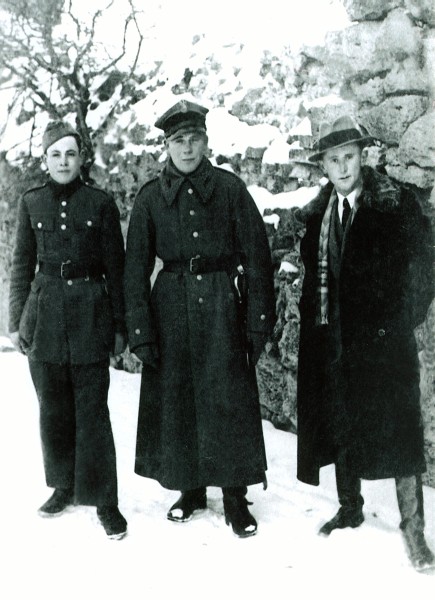
Wisia's half-brother, Mietek, on the far left with two friends. Soon after this photograph was taken he was beaten by Ukrainians and left for dead in a ditch close to the Sobierajski farm in Tajkury.
Wisia's parents, Wojciech and Apolonia, found the severely injured Mietek and nursed him back to health, keeping him hidden in straw bales in the stable. He recovered and ‘disappeared.’
At night Wojciech and Apolonia took their daughters, Marysia, Wisia, Ewa, Lucia and Zosia, into their fields and made them lie—youngest in the middle—on potato sacks between two rows of potatoes. Wisia remembers how her parents kept watch on either end, one with a rifle, the other a revolver. During the uncomfortable nights, they heard occasional shooting from their homestead but the family did not return to the house until the mornings.
Twenty years on in South Africa the old memories weighed on Wisia, then herself a mother of four—their daughter, Janet, was in England born after Roger.
“Bill had kept in touch with some of his Navy friends in New Zealand and they kept telling him how wonderful it was: They don’t bother to lock doors; they live with the Maori perfectly well; nobody steals anything; there is plenty of everything. And so we moved again.”
_______________
The sight of a few tiny, dull matchbox houses clinging to grey Wellington hills on a rainy day did not inspire the new immigrant family as they sailed into the harbour in September 1968.
“It was dismal. Was this the capital of New Zealand? We couldn’t believe it. There were no tall buildings and with all the rain it was sad and depressing.”
The people who had agreed to rent out their house… did not want a “coloured family”…
It did not help that when the family disembarked, the housing agent Bill had arranged to meet them seemed to have absconded with the cheque for a year’s rent on a furnished house. David and Billy became more miserable as the cold evening drew in. The family’s mood had changed considerably from the happy anticipation with which they had sailed from Durban the month before.
Bill left Wisia and his children on the dock and walked for an hour before he found the agent, who had apparently left a message with the ship’s captain: The people who had agreed to rent out their house changed their minds when they discovered the Watkins were arriving from South Africa. They did not want a “coloured family” in their house. Bill retrieved his cheque and solved the dilemma of his soggy family sitting on suitcases at the port by booking them into a hotel.
Hunting for another suitable rental did not immediately boost their image of Wellington. Bill and Wisia left Roger and Janet to look after David and Billy and inspected one house after another. Once they found a rental, in Karore, another practical hurdle was getting a furniture store to open on a Saturday so they could buy mattresses.
As Wisia scrubbed the house and organised the family, their accommodation became a minor issue for Bill, who faced a labour force he could not understand. In South Africa he had studied procedures in manufacture and when he was offered a foreman’s position at the Knight’s Shoes and Slippers factory in Lower Hutt he tried to implement changes he felt would boost production. His ideas did not impress the New Zealanders on the shop floor.
“They didn’t like him because he was a Pom, a foreigner. They said, ‘We’ve worked here all these years and none of us was made foreman.’” Bill could not understand their reasoning for not working longer hours or more efficiently: They believed that their extra wages would be ‘swallowed’ by income tax.
Within a year Bill had a job as the keeper of Queen Elizabeth Park near Paekakariki on the Kapiti coast north of Wellington. The job came with a house.
“He liked it and the children loved it because of all that space there and the sea. We were swimming all the time.”
As keeper, Bill hosted meetings of the Parks and Reserves Board and Wisia baked sponges and scones to serve with the tea. She enjoyed the catering and helping with the entertaining, and soaked up the same kind of carefree life she had as a child in Poland.
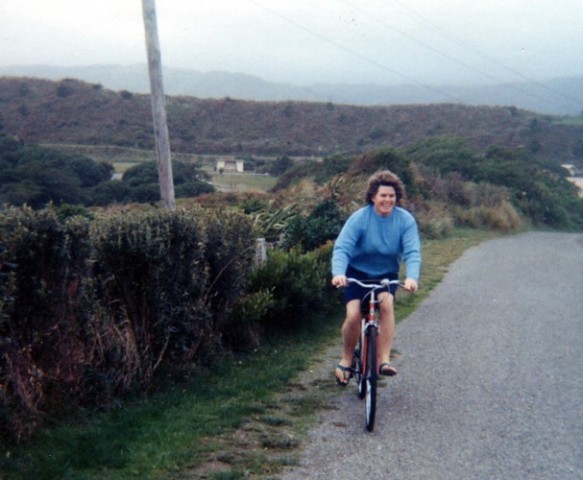
Always needing to explore her surroundings, Wisia soon bicycled her way around the 650-hectare Queen Elizabeth Park.
The family would have stayed there longer if, after three years, Bill had not seen a job advertised for head chauffeur at Government House. Wisia believed his previous positions in the British Royal Navy and the Kenyan Police Force played a major part in his successful application. The job included the use of another house on the grounds.
Bill spent 15 years driving for the governors general, their wives and various international guests, his first passengers were Sir Denis Blundell, the first New Zealand-born person to become governor general and his wife, Lady June.
Wisia started helping out in the main house during the Shah of Iran’s visit in September 1974.
“They were short of staff and I worked as a second housemaid to make the beds for Their Excellencies and the other guests.”
The Shah would not have linked this housemaid to the young girl who used to wave at him… in Teheran 30 years earlier.
The Shah would not have linked this housemaid to the young girl who used to wave at him as he travelled to and from his palace in Teheran 30 years earlier, but Wisia—usually outgoing and self-confident—could not bring herself to talk to him. (For Wisia’s previous encounters with the Shah, go to seeing stalin.)
“Of course he was older, but still recognisable. I could have [spoken to him] but I was too nervous. It was still wonderful to see him again.”
Soon after the Shah’s visit, Prince Charles arrived for the funeral of Labour Prime Minister Norman Kirk.
Nine-year-old Billy Watkins, keen to see this member of British Royalty, found a hiding place behind a flax bush at the entrance of Government House.
“Prince Charles got out of the car, picked Billy up and said, ‘I’ve got you!’ Having younger brothers, he knew exactly how to behave with little boys.”
Wisia was still comfortable about making the occasional snacks and sandwiches for guests at the official residence but remembered one incident when her grasp of the English language failed her. The function was for parliamentary officials:
“The butler poured out the drinks and I had to carry the tray and tell the guests what was in what glass. I must have taken about 10 trays around and getting a bit muddled when one gentleman said to me ‘And what’s in those glasses?’ I started telling him but when I came to the red one I said it was tomato sauce. ‘I think you mean tomato juice, he replied.’”
Wisia enjoyed the camaraderie of the Government House staff and remembers one member she was friendly with offering to show her a dress. He revealed a beautiful blue evening gown hanging in his wardrobe.
“I thought he was giving it as a present to a lady friend and was so surprised when he told me it was his.” Wisia had heard the staff using the word “queer” but assumed it was a description for a queasy stomach.
That dress viewing marked the end of her time working at Government House. Another staff member teased her husband about the episode and Bill insisted Wisia terminate her employment. She went to the controller to explain the reason for her resignation but she does not believe he passed on her reasons to Lady June because after that, she would not speak to Wisia. As hurtful as that was, Wisia did not approach her to explain her naivety.
“It was quite a hill, and she was getting on, but the staff wouldn’t let her have any chippies or peanuts… so she got her own.”
The subsequent governor general’s wife, Lady Norma Holyoake, impressed Wisia with her regular walks from Government House to Newtown to buy herself snacks.
“It was quite a hill, and she was getting on, but the staff wouldn’t let her have any chippies or peanuts because they said it was unhealthy—so she got her own.
“She was very friendly and told me about their early life when she was a teacher and Sir Keith was trying to get into parliament, and their children, and when they couldn't afford smart clothes and things.
“They were just ordinary people and very sincere. She told me how he used to tie his shoelaces together, put his shoes around his neck and walk barefoot to the Houses of Parliament. When he got near, he got out a duster, wiped his feet, put his shoes on and walked into the building.
“I thought, ‘That’s what I used to do in Poland on the way back from church.’ I loved walking barefoot as a child. Even after my First Holy Communion, I didn’t want to go home in the doroszka [cart] but tied up my shoes, put them around my neck, tucked my long white dress and petticoat into my pantaloons and walked the long way home so I could climb the cherry trees. Sir Keith reminded me so much of that kind of natural life.
“Life was very good in New Zealand. I met many important people and in the end they are just the same as you or me. They have their duty. I took them as they were.”
____________________
Bill continued working at Government House. Wisia became a cook-manageress in Winston’s head office in Wellington. The firm sold “everything” for buildings, from wood and cement to expertise and labour. Soon after Wisia joined, the manager told her the staff had requested that she write out the menu for the following day.
“They thought, ‘She’s Polish, she must have cooked a Polish meal,’ and stayed away.”
“I told him I was very sorry but I couldn’t do that. They will have to eat what I give them because I cannot guarantee what I am going to get when I’m shopping and I’m not going to plan ahead in case something happens and I cannot produce.”
The reasoning behind the request dawned on Wisia only after she finished preparing her first staff meal.
“I ordered two halves of beef and made roast, rump steak, roast potatoes, parsnip, pumpkin, beans and gravy and hardly anybody came. They thought, ‘She’s Polish, she must have cooked a Polish meal,’ and stayed away. I thought I would lose my job because I was Polish, but my husband was English and I cooked English food.”
The lunch break wore on and her food remained in the pots—then Janet's brother-in-law walked in.
“Because there was so much food and no one to eat it, I piled up his plate. He went back to the table and everybody was sniffing at his food and saying, ‘That smells nice,’ and he replied, ‘Bloody tastes nice too!’ Just before I closed the café the people came.”
Winston’s staff ate her cooking for another 10 years before Bill retired, she resigned, and they moved to Waikanae on the Kapiti Coast.
They bought, improved and sold two houses before the lure of a larger property led them to buy a small farm in Levin, where they lived for five years. Bill bought calves and sold them as yearlings “before they got too frisky.”
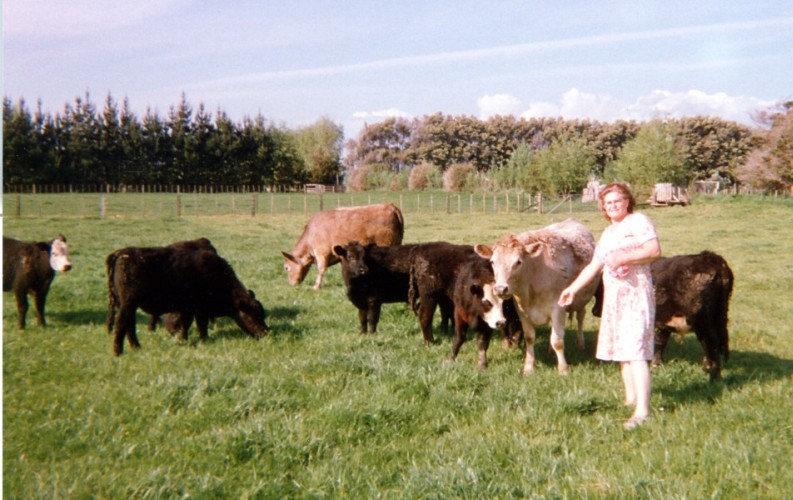
Soon after they moved in she started growing flowers for sale. Neighbours who approached her for flowers for the church suggested the venture, saying the previous owner had provided flowers for the church, and also sold them. Wisia grew dahlias and when an agricultural college bought the property next door she bought other blooms, including carnations “for next to nothing,” and sold mixed bunches of flowers ‘at the gate.’ (A New Zealand custom, where fresh produce is placed at a stall beside the roadside. Customers are expected to leave their cash in a nearby ‘Honesty Box.’)
“I used to arrange them nicely in bunches of about 10 blooms and sell them cheaply—about $2 a bunch—but people started to pinch them, especially ladies in posh cars.”
Tired of the thieving, she kept an eye on the people who stopped at the bottom of their driveway.
“One lady saw me coming from the house, opened her handbag and lifted her arm with the ‘banknote’ saying, ‘Thank you very much, I’ve got the right money.’ She rolled up the ‘note’ as I was walking towards her and left. It was a shop receipt!” Wisia chuckled as she recalled the story but she stopped selling flowers. Instead, she and Bill took an extended holiday in England and Canada, where their second son, David, had settled at the time.
“We could do this because we were cautious with our money and had made a bit buying and selling houses.”
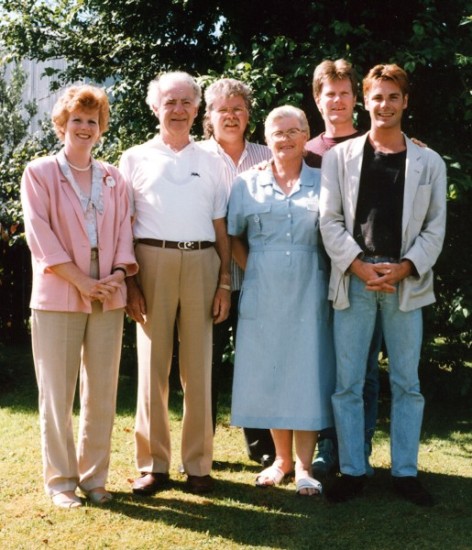
One of the last family photographs in Levin. From left: Janet, Bill, Roger, Wisia, David and Billy.
After Bill became ill and unable to look after the animals, they sold the Levin farm and moved back to Waikanae to a house with a “nice big garden.” It seemed ideal—but the large acreage meant they had six neighbours, and those neighbours had children who kept jumping the fence to play on their lawn, something Bill did not appreciate.
The neighbourly relationship soured further after Bill transformed most of the grass into a vegetable garden and shrubbery, and the frequent ball retrieval led to broken plants. This prompted a move to Winara Avenue and expansive views over Kapiti Island. Wisia, as a non-driver, appreciated being close to the bus-stop and train station, and loved living close to friends, shops and amenities.
____________________
Billy found a lifestyle block overlooking the Pauatahanui arm of the Porirua Harbour and invited his parents to share it.
“Bill [senior] always wanted to live in the bush. I didn’t want to leave Waikanae but he said to me, ‘We’ve been married for so long and we’ve lived for so long where it pleased you. For the last move, won’t you please me?’ and he did love it on the deck overlooking the harbour and with everything so peaceful.”
Wisia made the adjustment to a quieter life than she envisioned and nursed Bill as his health deteriorated. He died two years later in 2008.
Until Roger started to delve into his mother’s past and made a trip to Tajkury, Wisia had begun to look on her childhood memories as a distant dream. Only she and two sisters survived the USSR ordeal and she had lost hope of any kind of contact with her hometown, now behind the Ukrainian border.
Roger made the trip on her behalf and spoke to two people who remembered the Sobierajski family, one an elderly Ukrainian who recalled how the Polish priest told off Wisia’s father during Mass: Wojciech was being too kind to the local Ukrainian peasants. The other Tajkurian, who was at school with Wisia and her sisters, lived in nearby Równe.
Roger gathered enough information to get approval from the President of Poland to award his mother with the Siberian Exiles Cross (Krzyż Zesłańców Sybiru) in 2010. Established in 2003, it recognises Poles forcibly removed to Soviet forced-labour facilities between 1939 and 1956 and still alive in 2004.
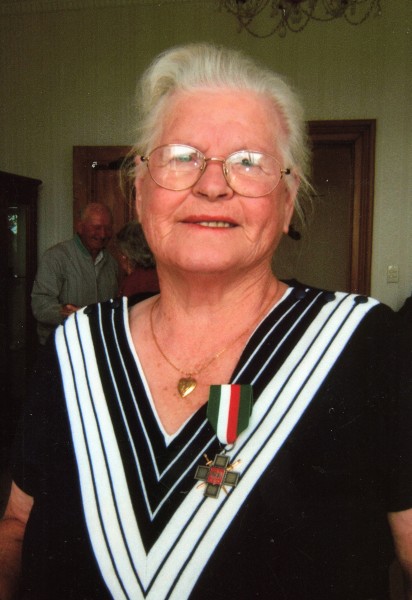
Wisia wearing her Siberian Exiles Cross after the ceremony at the Polish House in Newtown, Wellington.
“Here I am ending my life in New Zealand. I feel more at home here than I think I would feel being Polish in Poland. I’ve lived in so many different countries and I’ve got the memories. Now and then, I feel sad that I couldn’t continue living in Poland after we had to leave when I was so young.
“Sometimes I feel ‘I wish I could go home,’ but which ‘home’? No, I’m best here, so thank goodness, I’m home.”
© Barbara Scrivens, 2014
Updated September 2017
ALL PHOTOGRAPHS FROM THE SOBIERAJSKA-WATKINS COLLECTION
